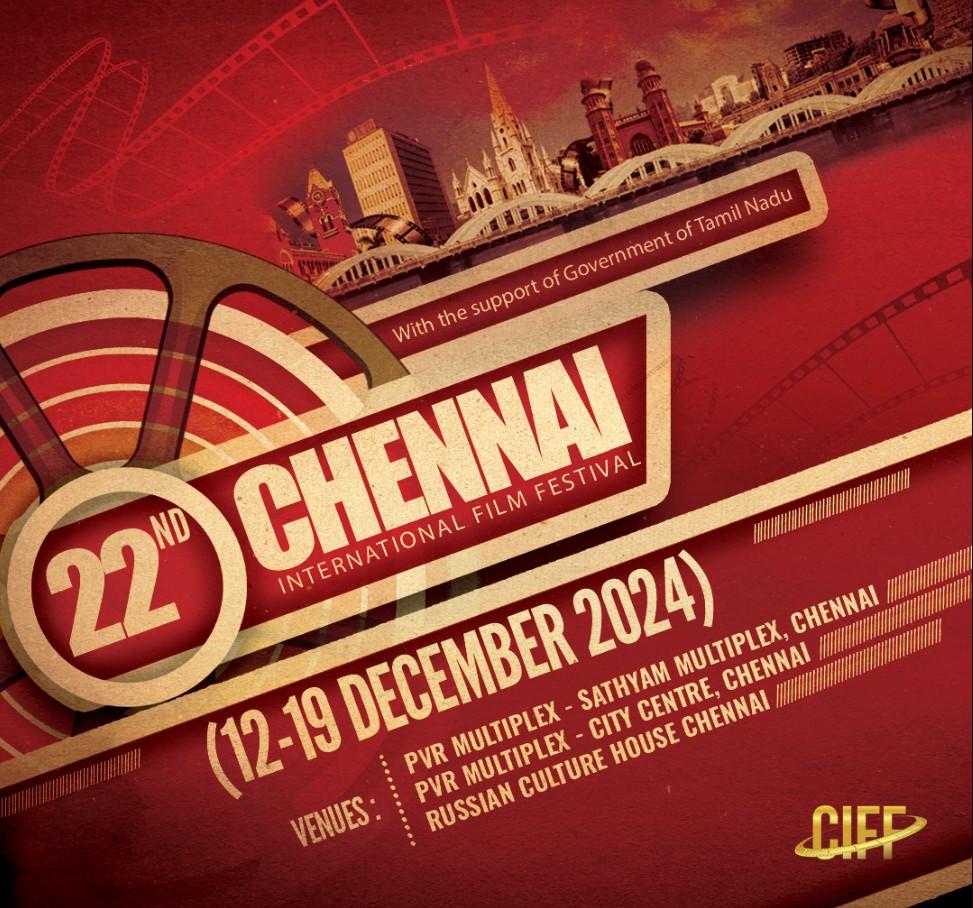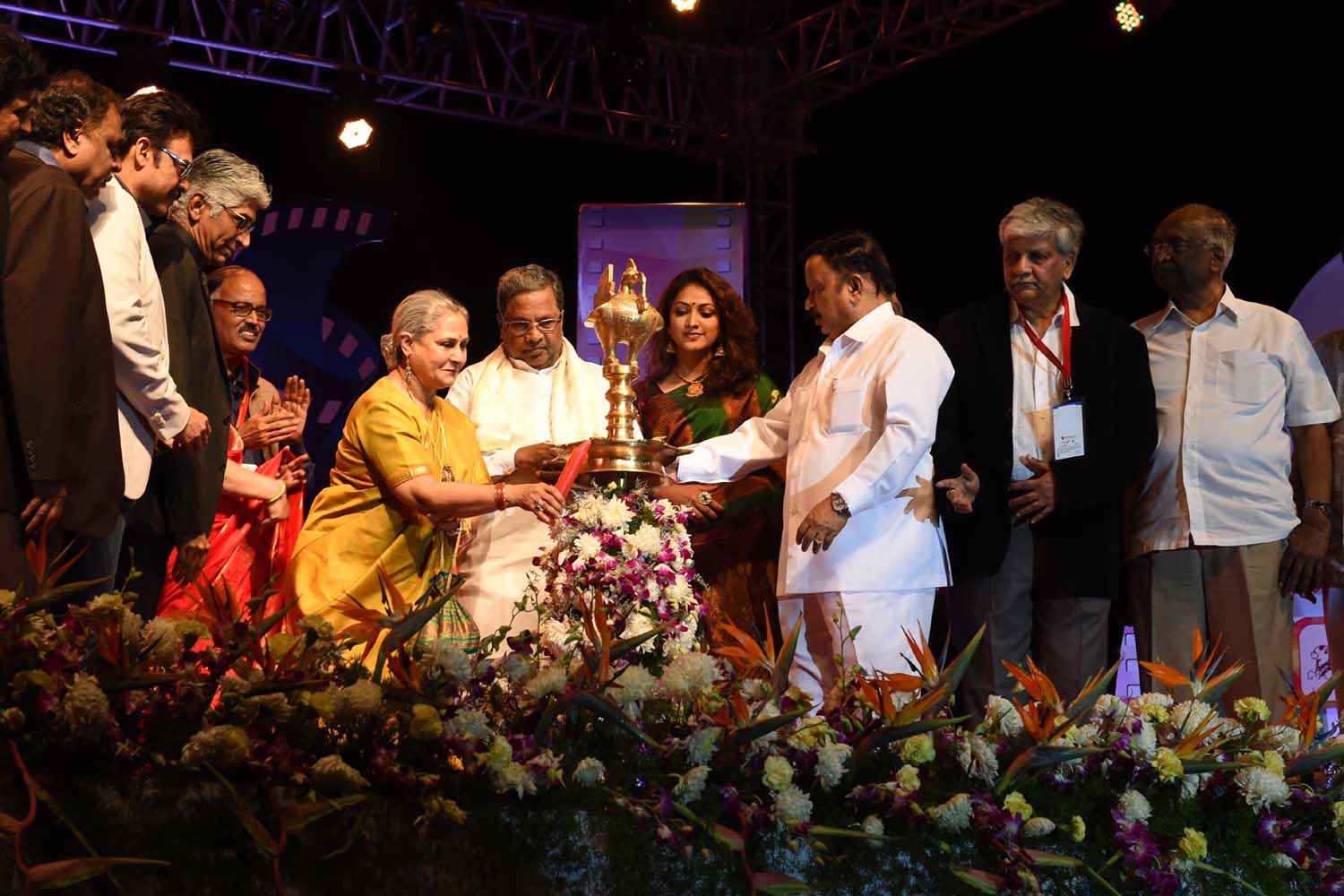“In a film festival, people come to watch because they are interested in cinema. It’s not like watching a premiere show or being in any cinema hall, where you are not with like-minded people.” Suhasini Maniratnam– Renowned multilingual Indian actress
The nine-day annual 22nd Chennai International Film Festival aka CIFF, organised under the aegies of Indo Cine Appreciation Foundation, called curtains on a high and successful note braving the inclement weather and Fengal fright, promising a bigger, better and bounteous show in the Xmas month of 2025.
The 22nd edition which saw several innovative introductions such as Red Carpet Screenings and Master Talks lived true to its billing as a film festival. Though modest on budget but big in intent and innovation to provide best of cinematic experience to the committed cine crazy diaspora of Capital City of Chennai,
That CIFF featured many award winning contemporary films from various international cine circuits, with two as opening (The Room Next Door) and closing film (Anora), and handful of ten others in the newly introduced Red Carpet Screenings, besides the two, is a testimony that what IFFI, Goa thought unnecessary depriving expectant cinephiles drawn from across the country to attend it, the pleasure of watching them, CIFF ensured it did not let its avowed and passionate cine buffs down.
While these big ticket award winning films turned a major draw among Kollywood’s fraternity and eager beaver delegates, besides ofcourse, Master Talks, among young, aspirational and studious students of cinema and cinegoers, an happy augury that Kollywood industry was safe in its new age GenX lot who thronged the festival. What, however, lent further luminescene to CIFF was the equal number of films that coveted this cinephile critic, cinema curator and film festioval programmer.
Shorn of limelight or hype and hoopla biggies enjoyed these captivating cinemas made their mark on the film festival almost unsung. Here is a pencil sketch of films that wowed this critic-curator who sought to share the same with fellow cine fans.
Winner of the Best World Feature Film award at the 22nd Chennai International Film Festival in the World Cinema Competition, In the Arms of the Treeby Iran’s Babak Lotfi Khajepasha is a highly emotive family melodrama revolving around the quintessential dilemma a couple on the verge of dissolution of their blissful 12 year long marriage face when they are harmstrung to separate their two inseparable children – who device their own attempt to ensure they all stay put together as a well knit family.
The Chinese film Above The Dustis a haunting parable of disappearing rural China by celebrated filmmaker Xiaoshuai Wang, whose films examine China of yore and in transition to its modern avatar. Spanning three generations of a family in rural China, it engagingly and emotively paints a kaleidoscopic portrait of their profound love for their land.
Told through eyes of 10-year-old who wishes to own a water pistol, the film, based on a bittersweet short story by Li Shijiang, is a poignant parable of what China has lost in its zealous drive towards modernisation, bringing to fore enduring connection betweengenerations of Chinese disapora and their shared love for theirhomeland.
The Austrian film Sleeping With A Tiger(Mit einem Tiger schlafen) by Anja by Vienna-born female director Anja Salomonowitzchallenging conventional cinematicforms, deftly exploresthe life of avant-garde Austrian painter Maria Lassnig, focusingon her struggle in the male-dominated art worldand her quest for her own personal artistic way of expressionas she navigates the societal prejudices about women through her bold and provocative artistic output on canvas.
Crickets, It’s Your Turn, turned out a surprising and intriguing film from Kazakhstan by young female director Uralsk born, Dubai based Olga Korotko. Making for an engaging and enchanting watch, this rather tantalising, taut and tense thriller revolves around 25-year-old Merey,who’s blissful and contended life is thrown into a turmoil whenshe meets the charismatic Nurlan, who invites herto a birthday bash. How the celebrations turn into intense, traumatic night, snaring her into perilous situation of personal surival forms the crux of the edgy film as it veers towards its climactic and horrific end.
German filmmaker Michael Fetter Nathansky’s nonlinear and nervy Every You Every Mewhich saw esclusive “women only”screeing as also Red Carpet Screening follows a 24-year-old singlemother of two, Like the traditional coal industry falling apart due to layoffs and modernisation, we witness a similar personal psychological and traumatic change in Nadine with their marriage on the brink of breaking with her perspective of Paul taking a turn for the worse. Set in Europe’s browncoal mining region, the film, makes for a rather difficult, discomforting watch as it exquisitely explores the fragileness of loveand the power of one’s perception of love and loss, how it begins and how it ends.
Swiss filmmaker Maxime Rappaz’s debut foray Let Me Go(Laissez-moi)makes for an interesting character study revoling round a middle aged woman with an invalid son who, every Tuesday, goes for an unattached sexual rendezvous while her neighbour takes care of her son. How her clockwork regimental routine is thrown asunder when one of her dalliance sees the man extends his stay and how the woman is suddenly snared between satiating her physical needs and break free from an otherwise constricting maternal duty she is shackled with.
The other Spanish fare Memories Of A Burning Body(Memoriesde un cuerpo quw arde) by Costa Rican female director Antonella Saudasassi is a subtle and deftly delt delicate study of three different women – Ana, Patricia, and Mayela raised in arepressive era where sexuality was taboo, whose understanding of womanhood was shapedby unspoken rules and implicit expectations.
How they confront the social situation they are boxed in embodied in a 65- year-old woman who reflects on a kaleidoscopic lifefilled with intertwined memories, secrets, andhidden desires, makes the film a fascinating and preceptive study of how woman of the times navigated through societal shackles on their freedom, personal desires and physical thoughts.
Australian film My Melbourne featuring a quartet of short stories by ensemble of Indian directors Onir, Rima Das, Imitiaz Ali and Rima Das, in association with emerging Australian co-directors, features an anthology that explore race, gender, sexuality, and disability through its diverse stories dealt with the typical individualistic directorial style of the filmmaker concerned.
Inspired by true events, the film brings to fore tales of Indraneel (Nandini), a queer and his estranged father exploring their fraught relationship and the power of forgiveness amid grief as the two reunite in Melbourne to complete a ceremonial ritual.In Jules you have the newly wed Sakshi and homeless Jules forming an unlikely bond, navigating their struggles and finding connection despite their differences and how small village Sakshi comes into her assertive own to negotiate her freedom and independence against her an otherwise domineering and tradition bound hubby.
Emma, features a talented deaf dancer, who grapples with her self-doubt and discrimination before a chance encounter with another deaf dancer inspires her to embrace her uniqueness and finally find her inner strength. The fourth revolves around Setara, a 15-year-old Afghan girl rebuilding her life in Melbourne after fleeing the Taliban, finding her sense of belonging through cricket amid family tensions and past trauma. Each of the ensemble enigmatic tale sparkle with the director’s individualistic styles and preoccupation with the thematic concern they touch upon in a subtle and sensitive manner.
The best of the lot is the Turkish flick beauty One Of Those Days When Hemme Dieswith its beguiling and cheery narrative style. Directed by Murat Firatoglu, his first feature foray, the roadie film follows a bankrupt and enraged Eyüp, toiling at a tomato field, embarking upon a singular intent of putting the bullet into his foreman Hemme for unpaid wages. But he is unwittingly time and again thwarted and diverted in town, by an series of encounters with people, leading to cooling of his simmering rage only to return back with the deadly deed undone.
Greek director Alexandros Avranas Swedish family drama Quiet Life about Russian refugee family seeking asylum in Sweden touches upon an interesting issue of how the family has to contend with the effects of resignation syndrome coma their daughters go into after denial and their trials to bring them back to normalcy.
Samia: The Little Dreamer, Somalian fare by woman director Yasemin Samdereli spotlights on the real life inspiring story of a young Mogadishu woman who challengessocietal norms and deeply traditional culture, to participate in the Olympic Games. While the Iranian flick Shahid by female filmmaker Narges Kalhor a thought-provoking politically surcharged film which exploresjustice, identity, and extremism, melding grittyrealism with dark humour as it follows a young woman seeking to do away with her surname which mean martyr.
Finnish film Stormskerry Maja (Myrsklyuodon Maja) by woman director Tiina Lymi is an emotionally surcharged survival saga revolving round a young peasant woman who is married off to humblefisherman and sets home in a remote island. How she wades through her life’s crises even as Crimean War lands on their doorstep and becomes a test of resilience and character makes for an engaging encounter.
Last, but not the least, the nearly three-hour Iranian thriller The Old Bachelor (Pir Pesar) that spirals towards a highly surcharged and bloody climactic close, by Oktay Baraheni revolves around a demonic and domineering old casanova who contemptuously holds his rather pussilanimous sons in a stranglehold and how his despotic dealing brings his end in the hands of his son who finally take courge to confront him.
Among the other films that caught one’s discerning and critical eyes include China’s 80 Plus by Xiao Shuai Wang about a couple who go on a roadie ride to seek euthanasia, Germany’s Fuhrer Und Verfguhrer (Goebbels & The Fuhrer/Fuhrer & The Seducer) about Joseph Goebbels, NaziGermany’s Minister of Propaganda who orchestrates his final, mostextreme propaganda act—Hitler’s suicide, themurder of his family, and his own death in 1945, as Germany stares at annihilation following the defeatof Hitler’s army atStalingrad,
The Hong Kong film All Shall Be Well ( Cong jin yihou) by Ray Yeung about a middle-aged lesbian couple when one of them passes away and her partner has to fight with the deceased family over their home and her entitlement to it, as also the way the funeral is taken care of.
Spain’s Mamifera by Liliana Torres where an unplanned pregnancy tests the couple’s individual dilemma who have divergent notions about raising a family, Shooting Blanks (Poslednji heroj) by Slovenia’s Zigi Virc, a black comedy about how the son of a partisan’s hero takes to thwart a German supermarket chain’s plan to demolish the memorial monument to build a shopping mall while his daughter and her beau seeking to conceive a baby are in for a rude shock following a revealation.
Shahid by Iranian-German filmmakerNarges Kalhor is a thought provoking, high octane socio-political treatise which tackles the issue of gender and extremism and other issues in its black comedy format. Fragrant (Atr Alood) by Iran’s Hadi Moghadamdoost which follows a perfumer’s struggle to comprehend and come to terms with the enormous prospects and responsiblity of welcoming the birth of his child.
Czech Republic’s Waves (Vynl) by Jiri Madi set during the Prague Spring and subsequentWarsaw Pact invasion of Czechoslovakia, spotlights on on agroup of young radical youth, working with international news office atCzechoslovak Radio,who, amidst politicalupheaval, grapple with the moral dilemma sacrificing their personal safety to safeguard the truth, and explores themes ofpolitical freedom, personal integrity, and thepower of media during times of crisis.
The festival, which featured over 75 plus contemporaryn international cinemas, culled and curated from the past and present years, provided a wonderful platform both for audiences and the practitioners to savour some of the rich repast of nifty and nuanced thematic narratives explored by an equally enterprising and ensemble of movie makers. Vive la Cinema!
“Truth is, generally I like film festivals; somewhere at some level there’s an exchange of ideas.” – Willem Dafoe, American Actor
by

S VISWANATH is a veteran film critic who officiates as JURY at several National & International Film Festivals. He deputises as CHIEF CINEMA CURATOR/PROGRAMMER & CREATIVE ADVISOR for Bengaluru International Film Festival (BIFFes). He also curates & advises on the selection of shorts & documentaries for Bengaluru International Short Film Festival (BISFF). Mr Viswanath is the author of “RANDOM REFLECTIONS: A Kaleidoscopic Musings on Kannada Cinema”.























Leave a Reply